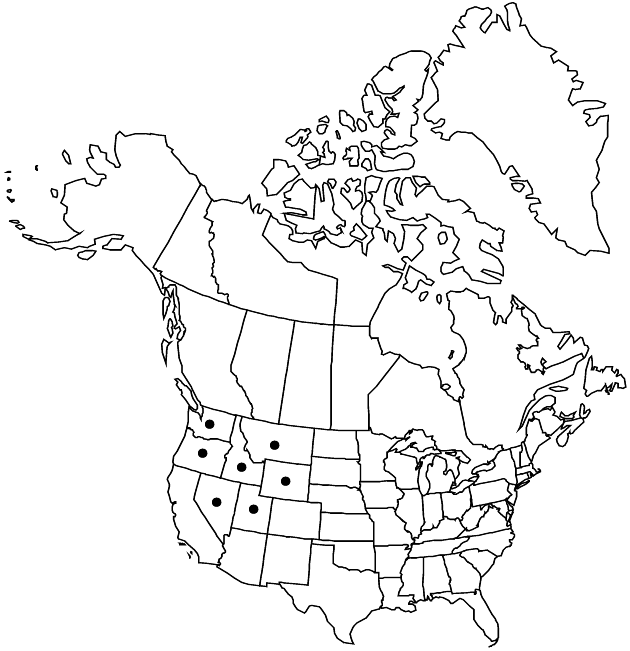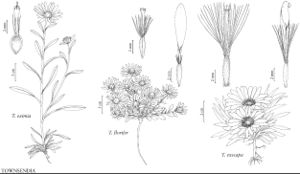Difference between revisions of "Townsendia florifer"
Proc. Amer. Acad. Arts 16: 84. 1880.
FNA>Volume Importer |
FNA>Volume Importer |
||
| (4 intermediate revisions by the same user not shown) | |||
| Line 7: | Line 7: | ||
|year=1880 | |year=1880 | ||
}} | }} | ||
| − | |basionyms={{Treatment/ID/ | + | |basionyms={{Treatment/ID/Basionym |
|name=Erigeron florifer | |name=Erigeron florifer | ||
|authority=Hooker | |authority=Hooker | ||
| + | |rank=species | ||
| + | |publication_title=Fl. Bor.-Amer. | ||
| + | |publication_place=2: 20. 1834 | ||
}} | }} | ||
|synonyms={{Treatment/ID/Synonym | |synonyms={{Treatment/ID/Synonym | ||
|name=Townsendia florifer var. watsonii | |name=Townsendia florifer var. watsonii | ||
|authority=(A. Gray) Cronquist | |authority=(A. Gray) Cronquist | ||
| + | |rank=variety | ||
}} | }} | ||
|hierarchy=Asteraceae;Asteraceae tribe Astereae;Townsendia;Townsendia florifer | |hierarchy=Asteraceae;Asteraceae tribe Astereae;Townsendia;Townsendia florifer | ||
| Line 29: | Line 33: | ||
|elevation=400–2300 m | |elevation=400–2300 m | ||
|distribution=Idaho;Mont.;Nev.;Oreg.;Utah;Wash.;Wyo. | |distribution=Idaho;Mont.;Nev.;Oreg.;Utah;Wash.;Wyo. | ||
| − | |discussion=<p>J. H. Beaman (1957) considered plants intermediate between Townsendia florifer and T. parryi to be hybrids. Such intermediates occur in Montana (e.g., Jones in 1905 from Gallatin Co. and Suksdorf 282 from Park Co.), outside the known distribution of T. florifer.</p> | + | |discussion=<p>J. H. Beaman (1957) considered plants intermediate between <i>Townsendia florifer</i> and <i>T. parryi</i> to be hybrids. Such intermediates occur in Montana (e.g., Jones in 1905 from Gallatin Co. and Suksdorf 282 from Park Co.), outside the known distribution of <i>T. florifer</i>.</p> |
|tables= | |tables= | ||
|references= | |references= | ||
| Line 38: | Line 42: | ||
-->{{#Taxon: | -->{{#Taxon: | ||
name=Townsendia florifer | name=Townsendia florifer | ||
| − | |||
|authority=(Hooker) A. Gray | |authority=(Hooker) A. Gray | ||
|rank=species | |rank=species | ||
| Line 53: | Line 56: | ||
|publication year=1880 | |publication year=1880 | ||
|special status= | |special status= | ||
| − | |source xml=https://jpend@bitbucket.org/aafc-mbb/fna-data-curation.git/src/ | + | |source xml=https://jpend@bitbucket.org/aafc-mbb/fna-data-curation.git/src/f50eec43f223ca0e34566be0b046453a0960e173/coarse_grained_fna_xml/V19-20-21/V20_434.xml |
|tribe=Asteraceae tribe Astereae | |tribe=Asteraceae tribe Astereae | ||
|genus=Townsendia | |genus=Townsendia | ||
Latest revision as of 20:28, 16 December 2019
Biennials (perhaps flowering first year, sometimes persisting), 3–12(–15+) cm. Stems decumbent to erect; internodes 3–12(–15+) mm, piloso-strigose. Leaves basal and cauline, blades spatulate to linear, 10–25(–50+) × 2–3(–8+) mm, not fleshy, faces ± strigose. Heads at tips of stems. Involucres ± hemispheric or broader, 16–20(–30) mm diam. Phyllaries 24–30+ in 3–4+ series, the longer ± lanceolate, (6–)9–11+ mm (l/w = 2.5–5), apices acute, abaxial faces strigose. Ray florets 13–34+; corollas white or pinkish adaxially, laminae (8–)10–18+ mm, abaxially usually glandular-puberulent, rarely glabrous. Disc florets (80–)100–150+; corollas (4–)5.5–6+ mm. Cypselae (3.5–)4–5+ mm, faces hairy, hair tips entire or forked; pappi persistent; on ray cypselae 20–30 subulate to setiform scales 2–6 mm; on disc cypselae 20–30+ subulate to setiform scales (4–)5–7+ mm. 2n = 18.
Phenology: Flowering Apr–Jun(–Aug).
Habitat: Gravelly flats with junipers and sagebrush
Elevation: 400–2300 m
Distribution

Idaho, Mont., Nev., Oreg., Utah, Wash., Wyo.
Discussion
J. H. Beaman (1957) considered plants intermediate between Townsendia florifer and T. parryi to be hybrids. Such intermediates occur in Montana (e.g., Jones in 1905 from Gallatin Co. and Suksdorf 282 from Park Co.), outside the known distribution of T. florifer.
Selected References
None.
